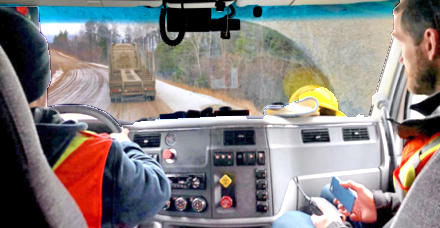
Truck platooning research has taken a quantum leap forward and in the process earned a spot in history by successfully road testing the emerging technology in the deep forests of Quebec in the first trial of its kind in Canada. The day-long trial (by FPInnovations and partners) took place in Rivière-aux-Rats, Quebec and signalled the beginning of a transformation of the forest transportation industry on a scale not seen in decades. It could also solve the chronic issue of a skilled-driver shortage that’s plagued the industry for years and shows no signs of abating. Source: Timberbiz
Tests involved two platooned trucks hauling logging trailers on resource roads between a Resolute Forest Products sawmill and the company’s logging site 75km away. Drivers were at the wheels of the trucks but in the future, only the lead truck will have a driver and the following trucks will be fully automated.
“These tests are a major accomplishment,” said FPInnovations lead scientist, Francis Charette. “To the best of our knowledge, no-one has tested platooning in a forest environment before.”
The trial is part of a joint research project in collaboration with Transport Canada, Alabama’s Auburn University, and Resolute Forest Products. At the same time, platooning was also successfully tested by FPInnovations’ PIT Group, Transport Canada, and Auburn University on public highways in Quebec. The platooning technology was developed by Auburn University’s department of mechanical engineering.
“There are switchbacks, steep slopes and dense forests that impact the communications systems between trucks,” said FPInnovations engineer, Édouard Proust. “We expected that and we’re working on the technology to solve the issues.”
Until the trials, there was no data available on how a platooning system would work under the thick canopy of a forest. “Now we know what the technology gaps are, we’re addressing them,” says Auburn University mechanical engineering professor and director of the GPS and Vehicle Dynamics Laboratory, David Bevly.
“Our platooning technology has already been successfully implemented on highways and it can include forestry operations.”
Truck platooning is an emerging vehicle technology in which trucks are linked by a computer system that maintains the desired distance between trucks, as well as controls acceleration and braking, reacting faster than a driver typically can. Platooning uses a dedicated short-range radio communications (DSRC) protocol approved for communications at high-speeds, as well as a GPS system, and radar technology. Highway platooning is already legal in several U.S. states, including Tennessee and Georgia. However, platooning is only in the testing phase in Canada.
“We’re very glad to be a part of the tests,” says Resolute Forest Products director of forestry operations, Jonathan Perron. “The forestry industry has to be innovative to compete globally and the concept of automated platooned trucks following one lead truck driver can help us improve our efficiency despite a labour shortage that’s affecting our industry across the country. We also believe that this type of technology will help us attract a new generation of forestry workers.”







